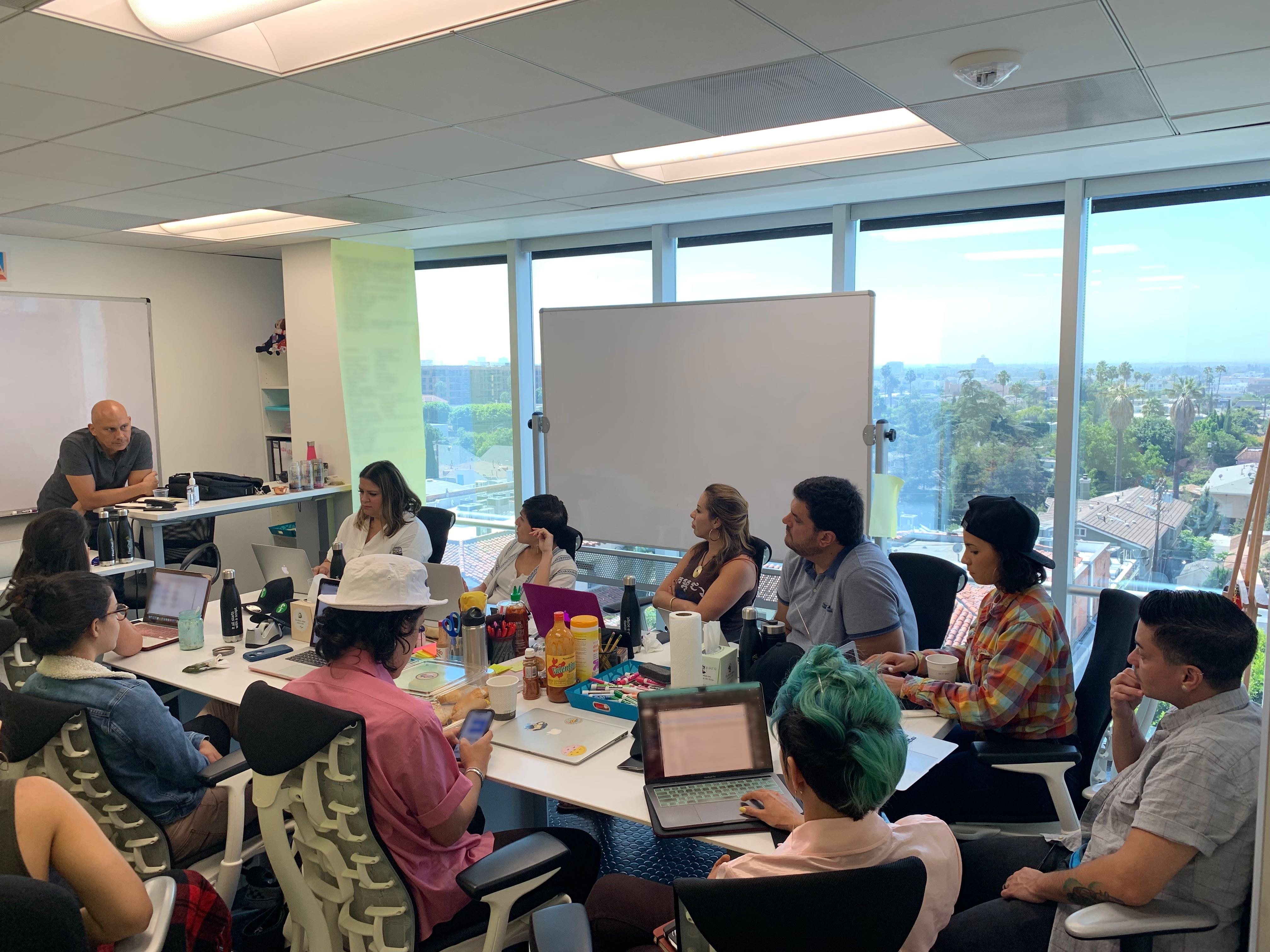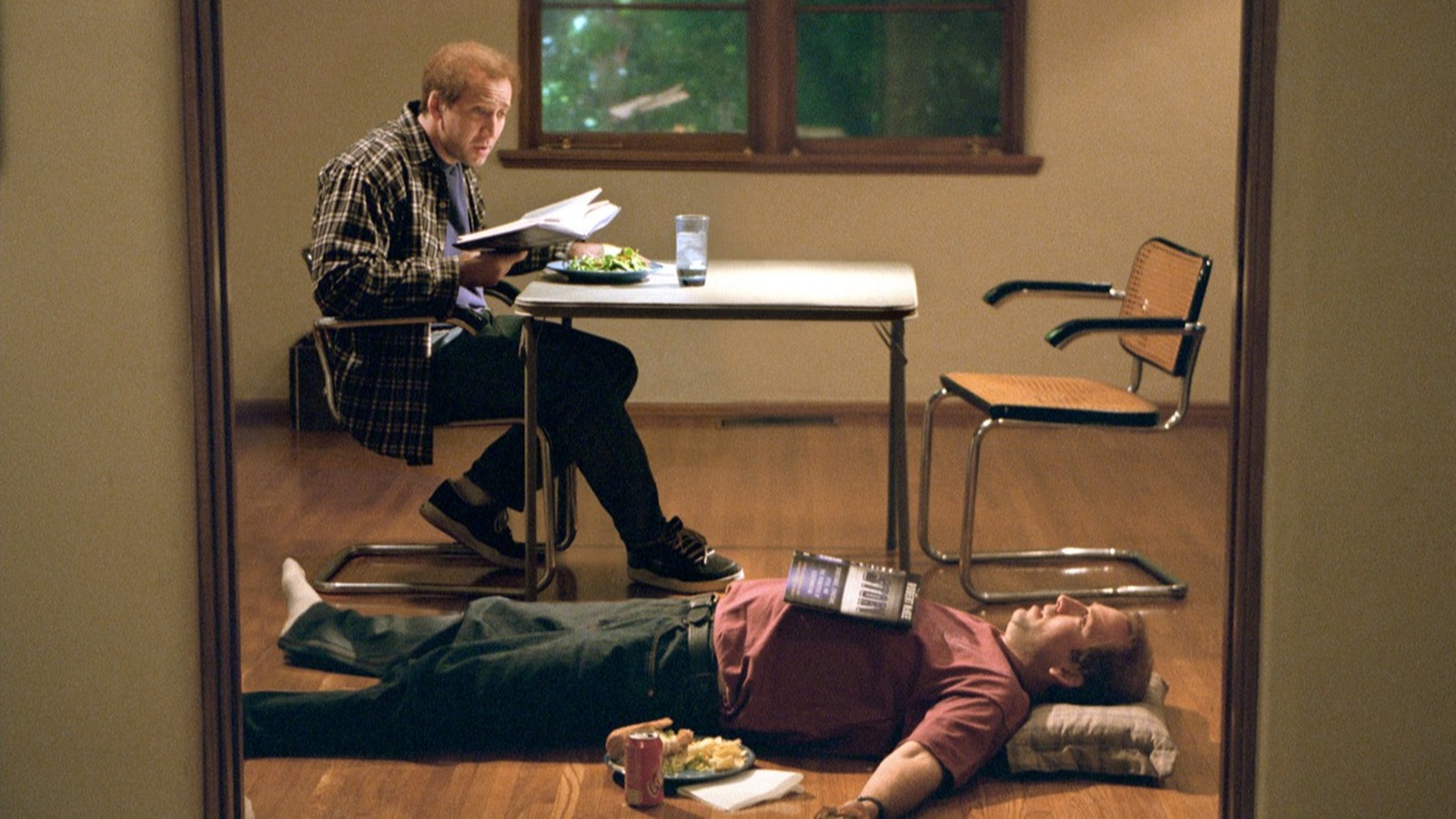The Bricks of Breaking In: Showrunners Justin Halpern and Patrick Schumacker On The Power of Teamwork
June 20, 2023
For showrunners Justin Halpern and Patrick Schumacker (Abbott Elementary, Harley Quinn), their interests in writing came in very different ways. With Halpern, it was a competition to write a Seinfeld spec when he was just 16 where the winner had the opportunity to sit in on an editing session for Law & Order. According to Halpern,
“I sat down to write that episode and I completed it. It was literally the only thing in my life I could ever complete and that gave me that kind of joy to do. So, I think that’s when I first knew.”
Schumacker’s passion for writing came out of a lot of dabbling which led to aspirations of becoming a commercial director and directing music videos. Schumacker recalls,
“Growing up I was a big comic book reader, so a lot of my writing was sort of sequential art based. I also grew up loving SNL. I’d tape every episode on VHS after watching it with my mom live every Saturday night and so I did a lot of sketch writing like even in grade school. I remember doing a parody of some Olympic downhill skier from Germany in sixth grade and it killed.”

Teamwork
A summer internship at Quentin Tarantino’s production company brought the two together. Halpern was living in a condemned frat house, of which he wasn’t a member, and just didn’t want to be there. As a result, he and Schumacker would escape to one of the many one-off theaters in Westwood where the pair could walk to and take in a film. Schumacker relates,
“The first movie we saw together was Pootie Tang, and we both thought it was hilarious. We were dying laughing and I think that was sort of our meet cute.”
The two realized that their sensibilities had an overlap so they teamed up and have been working together ever since. It’s a professional partnership that has been constantly evolving. Schumacker admits,
“It was only until recently that we have really drilled down on how we like to divide and conquer. We used to kind of do everything together. But I think the older we get, and now we’re parents and we’re exhausted, we’ve become a little smarter about how we’re able to divvy stuff up, but of course that requires ultimate trust with each other.”
The duo is often asked about how to find and build writing partnerships. Halpern encourages writers to view forming a writing team in the same terms as how someone picks a spouse. It’s essential to have a firm foundation at the center of your relationship. Halpern explains,
“You wouldn’t be like, should I pick a spouse? You’d be like, I met someone. I really like that person. We’re hanging out. Now we’re hanging out more. Now I think I want to spend a lot of time with them.”
After being writing partners for over twenty years, both Halpern and Schumacker know how the other is going to react to things. Most importantly, they know they can speak frankly to one another and the other person isn’t going to run. They can handle tough conversations and have confidence that they’ll still be there for each other.
Something writers may not realize about being part of a team is that you split things 50/50. This can make those early days of working as a team financially taxing. Even after being on a few shows, Schumacker had to take freelance gigs back in the commercial world he came from. He recommends writers who jump into this sort of partnership save their money along the way.
As showrunners, Schumacker does see a big upside to writing teams. He points out,
“You’re getting two heads for the price of one essentially. I have recommended to certain people that maybe struggle in certain areas to find a partner who can plug those holes.”
Read More: The Bricks of Breaking in: Tips on Breaking in From Emmy-Nominated Writers

Staffing
When it comes to their own breaking in story, Halpern credits his Twitter feed that caught lightning in a bottle and led to he and Schumacker co-creating the CBS comedy series, $#*! My Dad Says, starring William Shatner. Behind the leap to this career success came years of struggle. Halpern elaborates,
“He and I had been writing together for six years before that. We were given this really fortunate lucky break, but we had been writing scripts and we had a manager and we were trying to work in features and television. So when we were given this really fortuitous break, we had a lot of stuff ready to show people. It was those hours we had put in before then that made the learning curve not so steep.”
For staffing in their own rooms, whether it be an animated series like Harley Quinn or broadcast comedy like Abbott Elementary, the pair likes to have between 8 and 11 writers and overall run the rooms almost exactly the same way.
The way writers break in these days really varies, but Halpern notes that the once traditional path of getting a job as a writers’ PA then moving to writers’ assistant, then script coordinator and then staffing is now very rare. Probably less than ten percent of writers he knows broke in like this.
Read More: The Bricks of Breaking In: TV Showrunner Moira Kirland On Staffing Season
There’s no one major path for finding writers when it comes to staffing for Halpern and Schumacker. Halpern shares,
“Sometimes it’s reps. We’ve hired a writer that had never worked before who was a really funny stand-up we liked. Sometimes it will be a friend of a friend or sometimes it will be somebody we met like when we talk to a group of writers or something and they’ll reach out.”
What do these showrunners look for when hiring? Halpern details,
“We want people who are conversationally funny who, when we’re in a staffing meeting with them, they’re not just like, hey, here are my four pitches.”
Schumacker adds,
“Be collaborative. Be positive. Try and be as open as possible about your personal life and how that might apply to the project that you’re working on with all of us.”

Imposter Syndrome
Getting your first writing job is an incredibly exciting time, but it also brings about a whole new set of challenges. Halpern realizes,
“The challenge for me was to learn how to contribute and not just word vomit. Like to try to think about what I’m going to say before I say it and I’m not someone who generally does that.”
Schumacker faced a very opposite issue, he was someone who was quite measured in his speaking and found himself dealing with horrible imposter syndrome. He reflects,
“I just did not have the confidence to do a good job that first season. On top of that, it was a double-edged sword because I’m a co-creator because I’m Justin’s writing partner. It was Justin’s story and he was looked at as this font of wisdom for this very personal story, and I allowed that to really exacerbate my imposter syndrome.“
Schumacker had such a difficult time that he was ready to reconsider his vocation. Even now as showrunners with multiple shows on the air and awards and acclaim coming their way, the pair admits that the imposter stuff never really goes away. It often circles back when getting a no on a project or idea.
Lessons From the Room
One of the biggest misconceptions in writers’ rooms is that you have to pitch the idea that goes in to be valuable. In Halpern’s experiences,
“You have to just pitch an idea that can lead to an idea that can lead to an idea that leads to the idea that goes in. If you are someone who does that, you’re going to work a really long time in this business, even if you’re someone who doesn’t get a ton of jokes in.”
Newer writers also tend to struggle with their role in the room, not only with how much to contribute, but how, and with following the showrunner(s)’ vision and processes. Schumacker offers,
“We’ve definitely been in situations where we’ll ask a writer to do something, like we’re at the outline phase and I’ve had a writer say to me, ‘I mean I’ll do it. It’s not going to be good.’ And I’m like, would you just try? Maybe it will be. Who knows? So don’t be obstinate. At a staff writer level, just be friendly. Be enthusiastic. I think enthusiasm goes a long way.”
Read More: 7 Lessons From Staffing in a Writers Room

Tips for Breaking Through
To break in, this duo recommends writers keep open to the variety of ways they can showcase their work. Halpern encourages,
“If you’re trying to write comedy, that can exist in many different ways like you’re making funny things on TikTok, you’re writing funny things in an article that you put up yourself. There’s lots of ways to show the world you are funny. Use all those avenues at your disposal.”
Schumacker advises writers to have patience. Their own road to breaking in took six or seven years of writing stuff on spec and entering contests and fellowships. Schumacker emphasizes,
“Try not to be discouraged. There are very few opportunities given how many people are trying to do this job, and so even if you have to take a job in the interim that’s adjacent to something that has to do with TV or feature writing, that’s cool because you’re going to build your network. That’s only going to beget other opportunities down the line.”
Written by: Kelly Jo Brick
Kelly Jo Brick is a TV drama and documentary writer. A Sundance Fellow and alum of Women In Film’s Writer/Showrunner Mentoring Circle, Kelly Jo is also the Vice Chair of the WGAW Genre Committee. She wrote the Telly Award-winning film PAUSE and the Frank Lloyd Wright documentary, The Jewel In The Woods. Follow her on Bluesky @kellyjobrick.bsky.social



